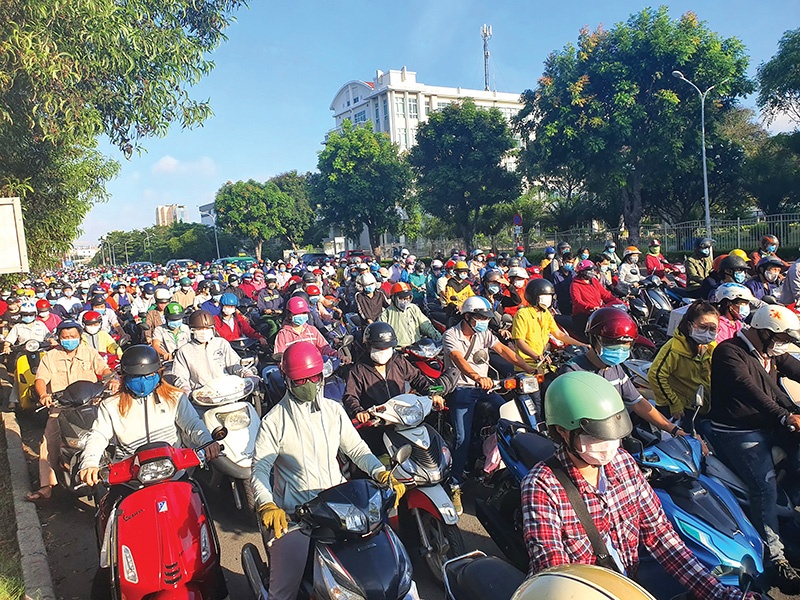Purpose-driven regulations desired for affordable housing
 |
| Workers in industrial zones are often struggling to find suitable housing. Photo: Le Toan |
Nguyen Thi Hoa and her husband from the central province of Quang Tri moved to Ho Chi Minh City more than 10 years ago, and now they are living in a decent motel with rent of VND1.4 million ($60) per month, near the Linh Trung 2 Export Processing Zone in Thu Duc City.
With a monthly salary of VND13 million ($565) for the couple, there is not much chance for Hoa’s family to afford a small flat in Ho Chi Minh City, even after a decade of trying to save.
“The price of houses is increasing at a rocketing speed and I would have to pay over VND1.2 billion ($52,000) for a 40 sq.m flat here, meaning around VND30 million ($1,300) per sqm,” Hoa said.
The price of social housing, however, is currently around VND13-17 million ($550-750) per sq.m but Hoa’s family would find it hard to meet the dozens of criteria that buyers must pass to have a slot at buying one.
Figures from the Ministry of Construction (MoC) showed that the demand for social housing from 2011 to 2020 was about 440,000 units in total. However, so far, only around 86,000 units have been completed.
Regarding houses for workers in IZs, figures from the Vietnam General Confederation of Labour released that over the last five years, the whole country has built 2.58 million sq.m of homes for them, occupying only 13 per cent of the demand. Moreover, since early this year, no social housing projects for workers has been completed due to the pandemic.
The MoC is currently revising the Law on Housing 2014, which will add more incentives for projects to build homes for workers. The ministry is also collecting comments on a draft decision for a national housing development strategy for 2021-2030, with a vision to 2040.
In the first phase, by 2025 the country strives to build over 222,000 social homes for about 890,000 low-income people in urban areas, and over 163,000 houses for 654,000 workers in IZs and export processing zones.
On November 2, the MoC said that it has sought approval from the prime minister for a massive VND65 trillion ($2.82 billion) credit package for building social houses. The credit component package would target workers in IZs who want to buy or lease homes, and project investors developing accommodation for sale to such workers.
Director of the MoC’s Housing and Real Estate Management Department Nguyen Trong Ninh said that currently the management and development of social houses is covered by the laws on housing, land, investment, and also Decree No.82/2018/ND-CP from 2018 on the management of IZs and economic zones (EZs).
“However, all of those legal frameworks have only regulated a general policy on social housing development while there have not been any separate documentation made for housing for workers,” Ninh said.
Pham Hong Diep, chairman of Shinec, the developer of Nam Cau Kien IZ, told a seminar on developing IZ infrastructure held last week that the capital sources to build worker’s housing are in a severe shortage.
Article 9 of Decree No.100/2015/ND-CP from 2015 stipulates that project investors are entitled to get preferential loans in Vietnam. According to Diep, however, the source of concessional loans from the Bank for Social Policies or credit institutions for social housing development is still limited.
Figures from the MoC noted that, according to the previous plan, the state was to allocate $391 million for building social housing by 2020. However, the budget allocated in the 2016-2020 period was $90 million only.
Meanwhile, the four commercial banks designated by the State Bank of Vietnam – Vietcombank, BIDV, Agribank, and VietinBank – have not yet been allocated capital to provide interest rate compensation for social housing loans from 3 to 4 per cent currently.
Along with the lack of capital, a lack of land funds to develop worker housing is also an existential problem. According to Diep, many localities have not included social housing development targets for workers in their annual 5-year housing development plans as prescribed by law, and have not yet planned and invested in technical infrastructure.
Article 5 of Decree 100 stipulates that real estate developers must set aside 20 per cent of their land fund for developing social houses, which can be replaced by cash submissions.
“This regulation leads to a fact that many developers scale down their projects to less than 10ha and submit cash instead of land for this responsibility,” Diep said.
Meanwhile, complicated procedures in social house development have prevented some investors from jumping in. Le Huu Nghia, CEO of Le Thanh Construction and Commercial Ltd., said the complicated procedures mean three years can be taken up for proceeding with a single project, discouraging developers.
Nguyen Tran Hai, director of Truong Phat Group, said that the company plans to build 10,000 units for workers in IZs in Ho Chi Minh City and the Mekong Delta province of Long An by 2025. However, he has had to halt this investment for now, even though 800 units are complete, due to complicated procedures the group cannot meet. Hai suggested the conditions could be simplified and focus on employees working locally, who have paid social insurance, and who do not have any accommodation yet.
“Investment profit in social housing is not high as the buyers are low-income people. If the regulations are complicated, it is very difficult for developers like us to implement projects,” Hai stated.
Decree No. 49/2021/ND-CP released in April on the development and management of social housing stipulates that investors of social housing projects are eligible to reserve 20 per cent of the total land area to build commercial housing. However, Hai said developers can never reach this figure because the cost of land compensation always rises.
| Tran Nhat Quang - Real estate expert
The proposal for a VND65 trillion ($2.82 billion) credit package for social housing projects as a positive signal, as workers need a place to settle and develop their careers. There are two types of investors who may benefit from this stimulus package: those who build houses for workers in IZs to rent, and those who build social houses. However, the total number of investors will be limited. For the former group, developers currently do not want to build and rent, simply because they have paid a lot of money and are not patient enough to collect the rent. They must focus on building and selling, then move to another project. For the latter one, there are only a few. Another issue is that the MoC requires the quality of homes for workers in IZs to be equal to commercial ones – a huge obstacle. There should be a trade-off or a transition period. If we insist on applying the same standards, poor people’s dreams will continue to be beyond reach. | |
| Truong Van Doi - Head of International Finance, CT Group
This proposed credit package will be of great significance to low-income people and IZ workers to realise their dreams of settling down. Since housing projects for low-income people frequently have a low profit margin, cash flow must be consistent with the plan to repay the loan principal and interest according to the current approval criteria that banks and investment funds require, making it difficult to access capital as proposed by the MoC. Banks must act rapidly to assist investors and borrowers with loan approval criteria in addition to interest rate support. The MoC’s support package is a positive signal for CT Group to prepare to work with banks immediately to access the capital and realise our enthusiasm to develop a series of projects with the DIYAS brand for low-income young people in Ho Chi Minh City and beyond. | |
| Bruno Jaspaert - General director, DEEP C Industrial Zones
The soft loans will create impacts to enable faster rollout of housing projects for workers inside industrial zones and DEEP C will be in favour of such a proposal. We overlooked that industrial zones are expanding very fast. We do not only need infrastructure and investors but also people. And those people are only drawn to work for the investors in the industrial zones if they can live somewhere. In the fast, it has been largely solved by using transportation, but that’s not enough. I believe it is crucial to set up housing for worker projects that can make a difference. It is the type of housing that offers clean space, schools for the children, and bicycle roads to commute to their factories. In terms of COVID, giving the control and obligation to control to industrial zone developers is important. If tomorrow, COVID 2.0 hits us, I believe the only way to safeguard the ongoing economic activities is by ensuring that people can live in the same bubble or living area of the factories, without having to sleep under their desks or in tents. It is very important to point out that if we can ensure area control over the whole industrial zone, who goes in and who goes out even if the city is suffering big time from COVID, that IZ can start living on its strength, with its own supplies, and workforce living inside or just adjacent to the industrial zone in the housing project. It’s a very powerful tool to contain the further spread of possible pandemic diseases. As an IZ developer, being allowed to obtain soft loans would make us more interested to invest because for us today, investing in the social housing projects is not financially interesting. Many people outside the IZ can offer low-quality and low-priced housing. As a result, the investors would prefer to rent that kind of location rather than a nicer built-in housing inside the IZ. Of course, the financing side being a lot easier will have a positive effect on the willingness for IZ to set up more housing for workers. In that case, DEEP C would be more than willing in setting up our housing-for-worker project. |
What the stars mean:
★ Poor ★ ★ Promising ★★★ Good ★★★★ Very good ★★★★★ Exceptional
Related Contents
Latest News
More News
- Construction firms poised for growth on public investment and capital market support (February 11, 2026 | 11:38)
- Mitsubishi acquires Thuan An 1 residential development from PDR (February 09, 2026 | 08:00)
- Frasers Property and GELEX Infrastructure propose new joint venture (February 07, 2026 | 15:00)
- Sun Group led consortium selected as investor for new urban area (February 06, 2026 | 15:20)
- Vietnam breaks into Top 10 countries and regions for LEED outside the US (February 05, 2026 | 17:56)
- Fairmont opens first Vietnam property in Hanoi (February 04, 2026 | 16:09)
- Real estate investment trusts pivotal for long-term success (February 02, 2026 | 11:09)
- Dong Nai experiences shifting expectations and new industrial cycle (January 28, 2026 | 09:00)
- An Phat 5 Industrial Park targets ESG-driven investors in Hai Phong (January 26, 2026 | 08:30)
- Decree opens incentives for green urban development (January 24, 2026 | 11:18)




 Tag:
Tag:





















 Mobile Version
Mobile Version